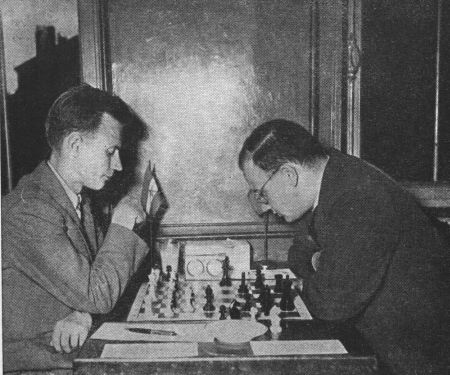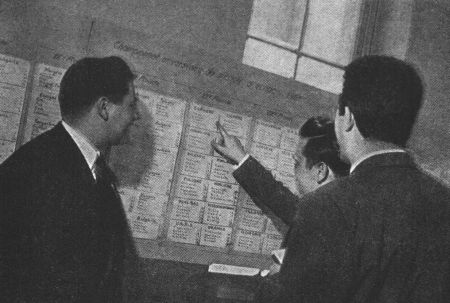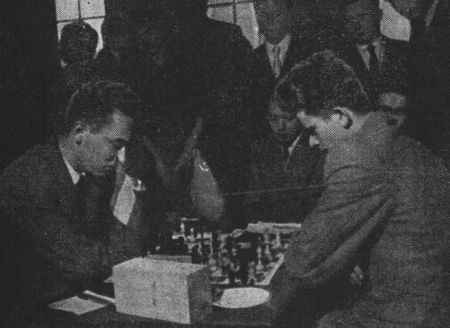 After the successful student chess championship held in Oslo, in 1954 at which the Czechoslovak student team was awarded the title of World Champion, the FIDE Congress in Amsterdam decided to organise regular world student chess championship. The organisation of the IInd World Student Chess Championship was entrusted to the French Chess Federation in co-operation with the International Union of Students, which was the first to come forward with the initiative to organise these interesting student contests.
After the successful student chess championship held in Oslo, in 1954 at which the Czechoslovak student team was awarded the title of World Champion, the FIDE Congress in Amsterdam decided to organise regular world student chess championship. The organisation of the IInd World Student Chess Championship was entrusted to the French Chess Federation in co-operation with the International Union of Students, which was the first to come forward with the initiative to organise these interesting student contests.
All preparatory and organisational tasks were accomplished in a comparatively short time thanks to the successful co-operation of the French Chess Federation, the International Union of Students and the Association Générale des Étudiants de Lyon. The World Student Chess Championship was played from May 6th—15th in the Hall of the AGEL. Thirteen teams took part. This is three more that at the Oslo tournament and shows the great interest of students throughout the world in chess.
 At the festive inauguration Mr. Marcel Berman, President of the French Chess Federation and Vice-President of FIDE came to welcome the participants. Others who delivered messages of greetings were Mr. Pataki, on behalf of the International Union of Students, Mr. Mallez, Vice-President of AGEL and a representative of UNEF, the National Union of French Students.
At the festive inauguration Mr. Marcel Berman, President of the French Chess Federation and Vice-President of FIDE came to welcome the participants. Others who delivered messages of greetings were Mr. Pataki, on behalf of the International Union of Students, Mr. Mallez, Vice-President of AGEL and a representative of UNEF, the National Union of French Students.
Mr. Folke Rogard, the President of FIDE had appointed Mr. Marcel Berman as chief referee and Mr. Jaroslav Šajtar as his deputy. The contest proceeded in a spirit of friendly competition and its results can be seen on the tournament table.
The Soviet students who won the title of World Champions for 1955 fully deserved their victory. In the first round they played the strong Yugoslav team. After an interesting game, the match ended in a draw. In the games that followed they scored one victory after another and defeated their opponents in a most striking manner. The difference of 8 marks between the first and the second team is sufficient proof of the Soviet representatives' superiority. The Soviet student team was led by the international Grand-master Mark Taimanov and included some of the outstanding participants in the last Soviet championship such as the Grand-master Boris Spassky and the Master Antoshin.
 The team that finished second — Yugoslavia — was also very strong. It was led by the international Master Fuderer, the national champion Karaklajić and by the international master Milić. Second place was only decided in the last round as is also shown on the table. The Yugoslav students fully deserved their place due to their high level of play. The Hungarian and Bulgarian teams followed with half a mark less. According to the tournament rules the Hungarian students won the third prize since they beat the Bulgarians 3-1. The Czechoslovak team which was defending the title of world student champion won in Oslo finished up on the 5th place. The composition of the Czechoslovak team was almost the same as in Oslo. It became evident however, that apart from the Grand master Filip who attained the best individual results on the first chess board none of the others were able to achieve anywhere near the same results as in Oslo. The Icelandic team obtained good results and the other teams took their places in keeping with their merits.
The team that finished second — Yugoslavia — was also very strong. It was led by the international Master Fuderer, the national champion Karaklajić and by the international master Milić. Second place was only decided in the last round as is also shown on the table. The Yugoslav students fully deserved their place due to their high level of play. The Hungarian and Bulgarian teams followed with half a mark less. According to the tournament rules the Hungarian students won the third prize since they beat the Bulgarians 3-1. The Czechoslovak team which was defending the title of world student champion won in Oslo finished up on the 5th place. The composition of the Czechoslovak team was almost the same as in Oslo. It became evident however, that apart from the Grand master Filip who attained the best individual results on the first chess board none of the others were able to achieve anywhere near the same results as in Oslo. The Icelandic team obtained good results and the other teams took their places in keeping with their merits.
The championship ended on May 15th when prizes offered by the International Union of Students were awarded to the first three winning teams. On the first chess boards the best results were obtained by Filip (Czechoslovakia) with 10 marks out of 12 games, on the second chess board by Spassky (Soviet Union) with 7½ marks out of 8 games, on the third chess board by Antoshin with 5 marks out of 6 games.
 The Soviet delegation offered a prize to Milić (Yugoslavia) for his brilliant result of 8 marks out of 10 games. On the fourth chess board Suetin (Soviet Union) obtained the best results with 8 marks out of 10 games. Vasiukov and Nikitin (both of the Soviet Union) were the best reserves with 4½ marks out of 5 and 5½ out of 6 respectively.
The Soviet delegation offered a prize to Milić (Yugoslavia) for his brilliant result of 8 marks out of 10 games. On the fourth chess board Suetin (Soviet Union) obtained the best results with 8 marks out of 10 games. Vasiukov and Nikitin (both of the Soviet Union) were the best reserves with 4½ marks out of 5 and 5½ out of 6 respectively.
AGEL provided excellent hospitality thereby ensuring the full success of the entire championship. The participants were also able to become acquainted with the life of French students. Meals were served in the AGEL student canteen. The tournament hall was also situated in the AGEL building and of the spectators who followed the games on the 64 chess boards with great interest, were students.
The excursion to the well known wine region at Beaujolais was highly successful. The French students prepared a number of interesting trips and cultural events.
Unfortunately, the late arrival of the Bulgarian and Polish teams called for increased efforts on the part of all the participants. On three occasions it was necessary to play two games a day and at the same time finish interrupted ones. We must express great appreciation for the sporting spirit of all participants who, fully aware that the entire tournament would have to be played under very difficult conditions, unanimously agreed to admit the Polish student team, who arrived late.
 The IInd World Student Chess Championship aroused lively interest in France and among the chess public of the world. The importance of the championship was underlined by the fact that it was held under the auspices of the Mayor of Lyon, the former President Mr. Herriot and the Minister of Education. A delegation consisting of Mr. and Mrs. Berman, Mr. Šajtar, Mr. Yemeniz, Mr. Mallez and Mr. Kotov went to see Mr. Herriot at his residence Bertold and presented him with a number of souvenir presents.
The IInd World Student Chess Championship aroused lively interest in France and among the chess public of the world. The importance of the championship was underlined by the fact that it was held under the auspices of the Mayor of Lyon, the former President Mr. Herriot and the Minister of Education. A delegation consisting of Mr. and Mrs. Berman, Mr. Šajtar, Mr. Yemeniz, Mr. Mallez and Mr. Kotov went to see Mr. Herriot at his residence Bertold and presented him with a number of souvenir presents.
The press, radio and television displayed a keen interest in the entire championship.
The IInd World Student Chess Championship ended as a great success confirming the correctness of the decision of the FIDE Congress to organise regular world student championships. The exchange of opinions between students from different countries contributed to strengthen the bonds of friendship among student chess players throughout the world. It helped to spread this noble game among the students.
We hope that the IIIrd World Student Chess Championship in 1956 will also be a great success.
/ Jaroslav Šajtar, International Chess Master /